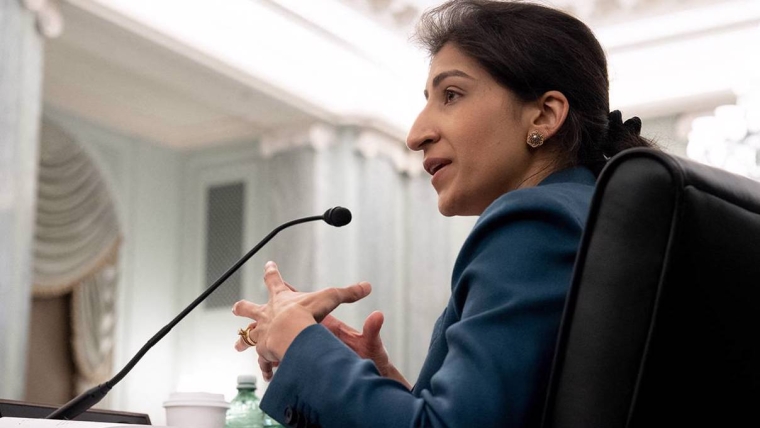
With the prominent anti-monopoly advocate Lina Khan having been appointed the new chair of the Federal Trade Commission, it is a good time to consider what influence the so-called New Brandeisians will have on US antitrust law. Khan is a leading figure in that movement, and another prominent exponent, Tim Wu, now sits on President Joe Biden’s National Economic Council. Arguing that antitrust law and enforcement are too weak and ineffectual, the New Brandeisians, named for the US Supreme Court Justice Louis Brandeis, are more open than traditional antitrust experts to breaking up monopolies.
Even before the New Brandeisians achieved prominence, there was a growing consensus that US courts and regulatory agencies do not enforce antitrust law as vigorously as they should. A long period of lax enforcement has led to more concentrated markets, higher prices for consumers, and skyrocketing corporate profits. A partial solution is to give regulators more resources and strengthen the standards that regulators use to approve big business mergers. A bill sponsored by Senator Amy Klobuchar of Minnesota proposes to do precisely that.
But beyond supporting these simple measures, the consensus among antitrust experts dissolves. The debate is shaping up as one between centrist or center-left technocrats who consider more enforcement resources and higher merger standards sufficient, and New Brandeisians who seek much more. (The right seems to be sitting on the sidelines, merely grumbling that Big Tech companies discriminate against Republicans.)
For their part, the technocrats are committed to traditional antitrust analysis, which weighs the benefits of market competition against the advantages of size. They believe that firms should be allowed to grow by offering superior products and services, even if they end up dominating markets. Mergers should be permitted as long as they generate economies of scale that outweigh the anticompetitive effects.
The New Brandeisians draw their inspiration from the anti-monopoly agitation of the Gilded Age. Late-nineteenth-century populists and twentieth-century progressives like Brandeis were not primarily concerned with efficiency, nor did they distinguish carefully between the effects of monopoly on prices, wages, competition, and other economic variables. Their argument was that the “robber barons” – men like the oil tycoon John D. Rockefeller and the steel magnate Andrew Carnegie – and their companies were simply too powerful. Their political and economic power were inconsistent with democratic self-government. It was this problem that antitrust law was meant to solve.
In the new antitrust debate, Big Tech is the flashpoint. When the technocrats look at that sector, they see firms that offer superior products and services at low prices, or even at no price at all. Business practices that raise antitrust concerns can be handled under prevailing standards, and should be condemned only after proof that, despite appearances, they raise prices. But the New Brandeisians see the recurrence of Gilded Age monopolisation and insist that while the harms are not recognised by traditional antitrust analysis, they are harms just the same.
One such harm is political interference. Monopolies no longer dole out bribes to legislators as they did in the nineteenth century, but Big Tech clearly exerts substantial influence on US politics. Democrats are still seething that the Russians used Facebook to propagate misinformation before the 2016 election, while Republicans complain that Facebook and Twitter kicked Donald Trump off their platforms. Depending on how you look at it, YouTube either spreads conspiracy theories or censors legitimate political dissent.
Another concern is perceived unfairness. Google supplies search results that include listings for Google-owned products and services. The Apple App Store sells Apple apps that compete with third-party apps. Critics argue that these and other companies take advantage of information they obtain from competitors who use their platforms to give their own products and services a competitive edge.
Yet another problem is the loss of consumer autonomy, stemming from the fact that Big Tech knows everything about us, from our shopping habits and search histories to our medical records and personal communications. Never before has so much been known about so many people. In authoritarian countries, this information is shared with the government. In the US, not so much; but it is shared with other companies, and it often falls into the hands of hackers and other bad actors. Worse, some tech companies have used their engineering prowess and psychological know-how to addict and manipulate users.
Finally, the Big Tech companies are seen as a threat to a diverse, textured internet economy. Many people lament the loss of quirky online offerings, which have been replaced by the drab monocultures of Facebook, Google, and Apple. The suddenness of this change helps to explain why people were once so upset when Walmart moved in and destroyed many small towns’ central shopping districts. While prices fell, a unique, often beloved, local commercial ecosystem was lost. Now, many towns are plowing taxpayer dollars into downtown revitalisation efforts, using public funds to recreate amenities that the public valued and that the market destroyed.
Against this backdrop, traditional economists argue that antitrust – a technical area of the law concerned with economic efficiency – is not the solution. Threats to small towns or larger democratic and economic values are better addressed with campaign finance laws, zoning laws, health and safety regulations, and so forth. There is much good sense to this view: if we replace antitrust law with an all-things-considered judgment about the good and bad that any large firm may do, regulators and courts will flounder, and political considerations will intrude. It would be better to address the pathologies of the tech market with well-defined legislative reform.
But New Brandeisians would counter by pointing out that big companies can use their political power to obstruct those very reforms. After all, the tech giants have already opposed privacy and data protections, and regulations of corporate speech will go nowhere with the current Supreme Court precedents that protect it.
Remember, the main nineteenth-century worry about monopolies was that they wielded too much political power. If you cut them down to size, perhaps they won’t, allowing democracy to flourish. Antitrust law is the only existing tool in US law for converting a big company that has too much power into a bunch of small companies that don’t.
Eric Posner, a professor at the University of Chicago, is the author, most recently, of The Demagogue’s Playbook: The Battle for American Democracy from the Founders to Trump (All Points Books, 2020). This content is © Project Syndicate, 2021, and is here with permission.

We welcome your comments below. If you are not already registered, please register to comment
Remember we welcome robust, respectful and insightful debate. We don't welcome abusive or defamatory comments and will de-register those repeatedly making such comments. Our current comment policy is here.